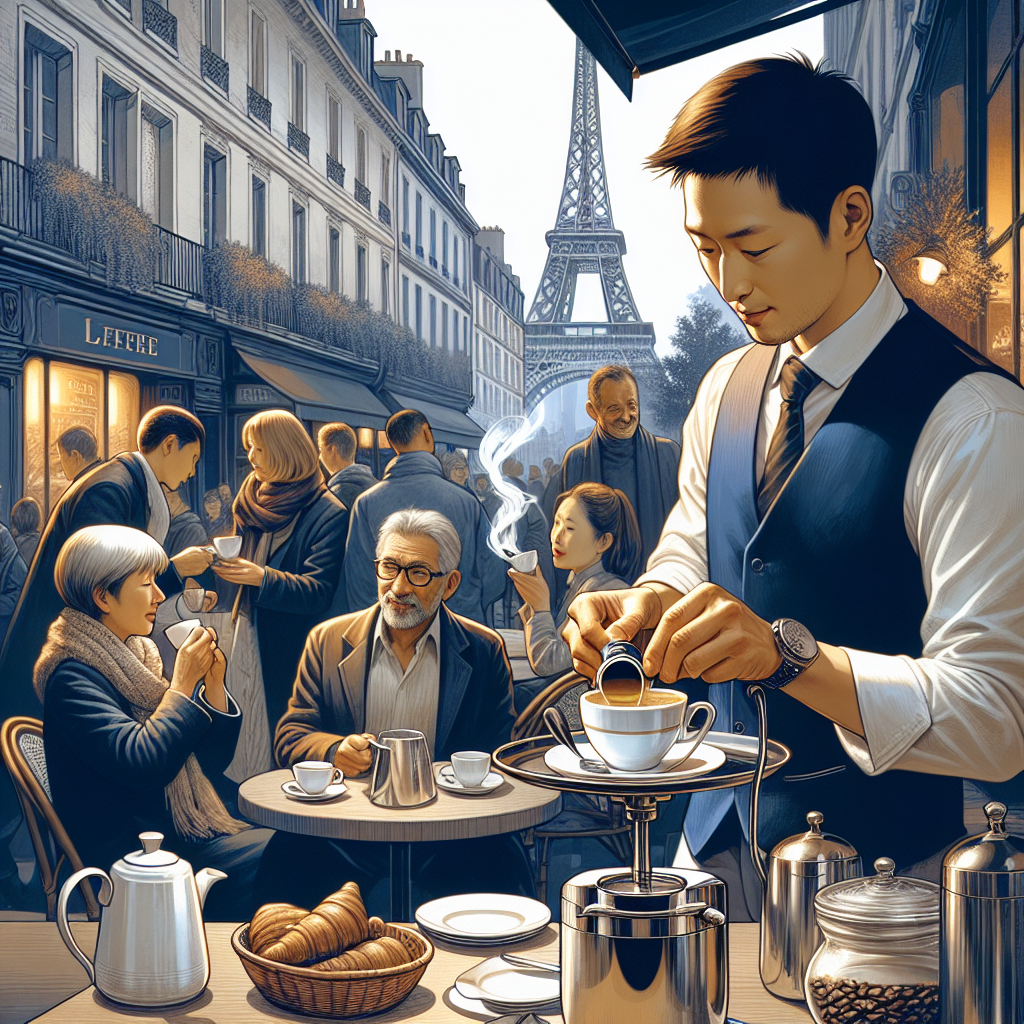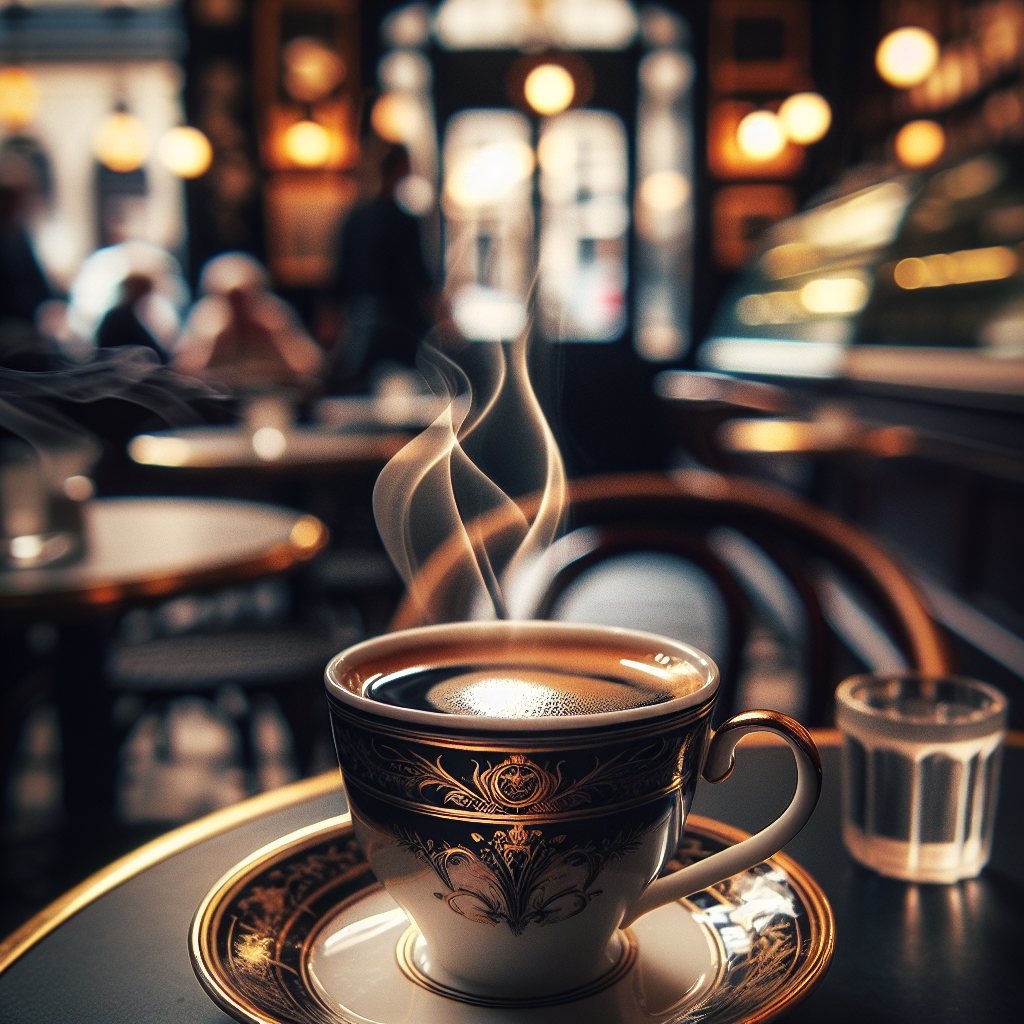Ah, coffee – a beloved elixir that has transcended simply being a beverage and become an integral part of cultures around the world. In the case of the French, coffee holds a special place in their hearts and their daily routines. From the aromas wafting out of the boulangeries in the morning to the leisurely moments spent at a café, sipping on a steaming cup of café au lait, coffee plays a crucial role in French culture. It is not just a drink, but a symbol of relaxation, socializing, and indulgence. Join us as we explore the fascinating and multifaceted role that coffee plays in the rich tapestry of French culture.

Coffee Consumption in France
The history of coffee in France
Coffee has a rich history in France, dating back to the 17th century. The beverage was introduced to the country by merchants and travelers who had encountered it in the Middle East. Initially, coffee was met with skepticism and even resistance from the French, who were more accustomed to drinking wine and other alcoholic beverages. However, over time, coffee gained popularity and became an integral part of French culture.
The rise of coffeehouses in France
The establishment of coffeehouses in France played a pivotal role in the rise of coffee consumption. These coffeehouses, known as “cafés,” quickly became popular gathering places for intellectuals, artists, and the general public. They provided a space for people to socialize, exchange ideas, and engage in philosophical debates. The café culture that emerged in France during the 18th and 19th centuries continues to shape the country’s coffee drinking habits to this day.
Traditional French coffee drinks
France is known for its unique and delicious coffee drinks. One of the most popular is the café au lait, which is a combination of coffee and steamed milk. It is typically served in a large bowl or cup and enjoyed with breakfast. Another beloved French coffee drink is the café crème, which is similar to a cappuccino and consists of equal parts espresso, steamed milk, and foam. The French also appreciate the simplicity of a strong, black espresso, often referred to as un café noir. These traditional coffee drinks are enjoyed throughout the day and are a staple in French cafes.
Coffee as a Social Ritual
Coffee breaks and social gatherings
Coffee breaks, or “pause café,” are an essential part of French social life. Whether at work, during shopping, or while exploring the city, taking a break for a cup of coffee is a common and cherished ritual. It provides an opportunity to relax, unwind, and connect with friends and colleagues. Coffee breaks are not rushed affairs; instead, they are leisurely moments to savor the taste and engage in meaningful conversations.
Coffee etiquette in France
In France, there are certain unwritten rules and etiquette when it comes to coffee. For example, it is customary to stir your coffee gently with a spoon before taking the first sip. Adding sugar or milk is a matter of personal preference, but it is not considered common to add a large amount of either. Additionally, it is customary to order a small glass of water alongside your coffee to cleanse the palate. Adhering to these etiquettes is seen as a sign of respect for the coffee and the cafe’s atmosphere.
Coffee in French Cuisine
Coffee in desserts
Coffee plays a significant role in French desserts, adding depth and flavor to various sweet treats. The classic dessert, Tiramisu, includes layers of coffee-soaked ladyfingers, mascarpone cheese, and cocoa powder. Café Liégeois is another popular dessert that consists of coffee-flavored ice cream, whipped cream, and chocolate sauce. The French have mastered the art of incorporating coffee into their desserts, resulting in mouthwatering creations that delight both locals and tourists alike.
Coffee in savory dishes
In addition to desserts, coffee is also used in savory dishes in French cuisine. Chefs often use coffee as a marinade for meats, such as beef or game, to impart a rich and smoky flavor. It can also be added to sauces, like a coffee-infused reduction to accompany a duck breast. The versatility of coffee in French cooking allows for innovative and exciting flavor combinations that elevate traditional dishes to new heights.
Coffee and French Art
The influence of coffee on French artists
Coffee has long been intertwined with the world of French art. Many famous artists, including Vincent van Gogh and Edouard Manet, were avid coffee drinkers and often found inspiration in the atmosphere of Parisian cafes. The lively conversations and intellectual debates that took place in these coffeehouses spurred creativity and influenced artistic movements. The act of observing people and their interactions over a cup of coffee became a muse for many renowned artists, resulting in iconic paintings that captured the essence of French cafe culture.
Coffeehouses as artistic and intellectual hubs
Coffeehouses in France have historically served as hubs for artistic and intellectual pursuits. They provided a space where writers, poets, philosophers, and artists could gather to discuss ideas, debate theories, and share their work. These vibrant and dynamic spaces fostered creativity and innovation, allowing for the exchange of ideas and the birth of new artistic movements. Even today, coffeehouses in France continue to inspire and nurture artistic endeavors, making them integral to the country’s cultural landscape.

Coffee and French Literature
Famous French writers and their relationship with coffee
Coffee has had a profound influence on the lives and works of many famous French writers. Honoré de Balzac, a prominent 19th-century novelist, was known to consume up to 50 cups of coffee a day while writing his extensive body of work. The caffeine provided the necessary energy and focus he needed to meet his demanding writing schedule. Other renowned French writers, such as Jean-Paul Sartre and Simone de Beauvoir, also frequented cafes, using coffee as a stimulant to aid their creative process.
Coffee as a literary symbol in French literature
In French literature, coffee often serves as a symbol representing intellectual freedom, creativity, and rebellion. The coffeehouse, with its lively discussions and diverse clientele, is depicted as a space where ideas flourish and societal norms are challenged. Authors have used coffee as a metaphor to explore themes of individualism, existentialism, and the pursuit of knowledge. The presence of coffee in French literature reflects its deep-rooted connection to French culture and the values it represents.
Coffee and French Politics
Coffeehouses as meeting places for political discussions
Coffeehouses have played a significant role in French politics throughout history. In the 18th and 19th centuries, coffeehouses served as meeting places for political activists, revolutionaries, and intellectuals. These establishments provided a safe space for like-minded individuals to gather, exchange ideas, and strategize for political change. The coffeehouses became hotbeds of political discourse, fueling revolutionary fervor and shaping the course of French history.
The role of coffee in the French Revolution
During the French Revolution, coffee played a dual role as both a symbol of the bourgeoisie and a catalyst for political change. The coffeehouses became important gathering spots for the bourgeoisie, who were at the forefront of the revolution. The coffee drinking culture of the bourgeoisie represented their wealth, sophistication, and progressive ideas. Coffeehouses served as meeting places for revolutionary groups to plan and organize, fueling their aspirations for a fair and equal society.
Coffee and French Fashion
The association between coffee and fashion in French culture
Coffee and fashion are intrinsically linked in French culture. The coffeehouse, with its stylish ambiance and vibrant atmosphere, became a place where fashion trends were showcased and discussions on style and aesthetics took place. French fashion icons, such as Coco Chanel and Yves Saint Laurent, were known to frequent cafes, drawing inspiration for their designs from the cultural and artistic movements discussed within these establishments. Coffeehouses served as a meeting point for the fashion-conscious and played a significant role in shaping French fashion.
Coffee as a muse for fashion designers
The rich aroma and visual appeal of coffee have inspired many fashion designers in France. The deep, earthy hues of coffee beans have found their way into clothing collections, with designers incorporating shades of brown and black to create sophisticated and timeless looks. The elegant and refined qualities associated with coffee have also influenced the choice of fabrics and textures, resulting in clothing that exudes a sense of luxury. Coffee serves as a muse for fashion designers by evoking a sense of decadence and elegance in their creations.
Coffee and French Language
French expressions and idioms related to coffee
The French language is rich in expressions and idioms relating to coffee. One popular phrase is “prendre un café,” which means to have a coffee and is often used as an invitation to socialize or catch up with someone. Another expression, “café crème,” is commonly used to refer to someone who is relaxed and carefree, similar to the smooth and creamy texture of a café crème coffee. These linguistic nuances demonstrate the significant role that coffee plays in French culture and everyday conversation.
The vocabulary of coffee in French
French has a specialized vocabulary for different coffee preparations and variations. For example, an espresso is simply called “un café” or “un express” in French. A café au lait is referred to as “un café crème,” while a cappuccino is known as “un cappuccino.” The variety of vocabulary associated with coffee reflects the importance and appreciation the French have for the beverage. It also adds a touch of elegance and sophistication to coffee-related discussions.
Coffee and French Identity
Coffee as a symbol of French identity
Coffee has become synonymous with French identity and is an integral part of the country’s cultural fabric. The French take pride in their coffee traditions and rituals, viewing it as a symbol of their refined taste and appreciation for the finer things in life. The French value the social and cultural aspects of coffee, with cafes serving as gathering places where people can connect, engage in meaningful conversations, and celebrate their shared love for coffee.
The coffee-drinking rituals of the French
Coffee-drinking rituals in France are deeply ingrained in daily life. The morning ritual of enjoying a cup of coffee, often accompanied by a freshly baked croissant or pain au chocolat, is a cherished tradition. Coffee breaks throughout the day offer moments of respite from work or daily activities, allowing individuals to recharge and reconnect with others. The French take their time to savor their coffee, appreciating the flavors and the company of those around them. These rituals reflect the French values of leisure, connection, and enjoying life’s simple pleasures.
The Future of Coffee in French Culture
Trends and innovations in the French coffee industry
The French coffee industry is constantly evolving, adapting to changing consumer preferences and embracing innovation. One notable trend is the rise of specialty coffee, with an increasing number of cafes sourcing high-quality beans and carefully crafting their coffee offerings. Cold brew and nitro coffee have also gained popularity, offering refreshing alternatives to traditional hot coffee. Additionally, there is a growing interest in sustainable and ethical coffee production practices, with consumers seeking out fair-trade and organic options.
The enduring importance of coffee in French society
Despite the evolving coffee landscape, coffee’s importance in French society remains steadfast. It continues to serve as a catalyst for social interaction, intellectual pursuits, and artistic expression. The rituals and traditions surrounding coffee in France are deeply ingrained in the cultural fabric of the nation, and it is unlikely that they will diminish in significance any time soon. Coffee will continue to be a symbol of French identity, connecting people across generations and shaping the vibrant and dynamic culture of the country.
